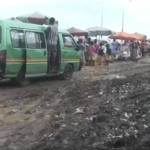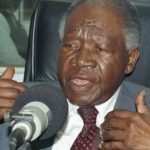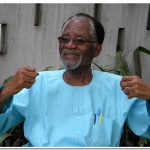Nigeria’s 2011 Elections Logic-Defying Permutations
Posted by By Akogun Akomolafe at 13 November, at 15 : 00 PM Print
Warning: count(): Parameter must be an array or an object that implements Countable in /home/alaye/public_html/wp-content/themes/Video/single_blog.php on line 46
Warning: count(): Parameter must be an array or an object that implements Countable in /home/alaye/public_html/wp-content/themes/Video/single_blog.php on line 56
The Nigerian factor is a little-known, little-discussed, and little-researched sociological phenomenon that is believed by many Nigerians to be the greatest impediment to their nation’s march to progress and prosperity. In many (let’s not use “advanced” here) countries, elections have become so routine that citizens cannot conceive of silly hiccups that would make them lose sleep. Ghana, Nigeria’s tiny neighbor and greatest rival in West Africa, has burnished her electoral expertise so much that it is called upon to assist other nations. But in the country that its citizens like to call the Giant of Africa, the simple act (art?) of compiling an electoral list, conducting credible elections, and announcing the winners remains a very serious major production.
Like in most things in their national life, Nigerians officials will wait until the proverbial eleventh hour before rallying themselves from their stupor. Planning does not appear to exist in the lexicon of Nigerian officialdom. Foresight and vision is sorely lacking in a nation that has ambitions to become one of the world’s 20th wealthiest countries by 2020.
It was no surprise therefore when the body charged with managing Nigeria’s elections, the Independent National Electoral Commission (INEC), announced that it would require an extension of time if it were to conduct a credible poll in the 2011 elections, originally slated for next January. Ironically, the body (with a budget of US$585 million) whose announced electoral results have always drawn so much laughter of derision has as its motto: “Transparency, Impartiality, and Integrity.”
The Commission, in a communiqué issued at the end of its retreat in Calabar and signed by its secretary, Alhaji Abdulahi Kangama, insisted that the time was too short to conduct a reliable voter registration and maintained that it would engage all the relevant stakeholders with a view to exploring all legal avenues for an extension of time.
Nigeria lacks credible statistics, and voter registers, like census figures, are often bloated.
We can lay the blame for this squarely at the feet of British colonial officials who, in order to appease their Hausa/Fulani friends, skewed Nigeria’s population in favour of the North. Nigeria remains the only place on earth where arid desert (North) is supposed to compose of more people than space with lush vegetation and rain forests (South). The British gave the North a numerically superior census figure, and it is this crooked figure the country has been using that is the cause of much of the nation’s palaver.
One of the reasons why changing the census figure is a matter of life and death (war) is that revenue allocation is shared based principally on population. Getting the giant’s share from the federal cake is why the Hausa/Fulani in the North will do everything within their power to maintain the fiction that Kano has greater a population than Lagos.
The other reason has to do with collaring political power. Until recently, Nigeria geopolitical calculations have rested on the quad pod of four sectors: North (Hausa/Fulani, East (Igbo), West (Yoruba) and South-South (the Delta).
With a population figure bloated in its favor, the North needs the support of just the minority Delta to win power. And the Deltans have faithfully produced this. This is the reason why the North has ruled for thirty-nine out of Nigeria’s fifty years of existence.
One interesting angle in the coming election is that for the first time, the ambitions of the North are clashing directly with that of their faithful ally from the South-South.
Many Nigerians see the coming elections as a watershed for their nation. They see the organizing of credible elections as a prerequisite for transforming their country. There is simply no way the nation can move forward when elected offices are filled by illegitimate occupants who simply bulldozed their way into power. It is a sentiment shared by many outsiders as well. According to an article published on Thursday, September 9 in Foreign Affairs, a journal of the US Council on Foreign Relations, John Campbell, US Ambassador to Nigeria from 2004 to 2007, believes that mismanaging the next elections could lead to post-election sectarian violence, paralysis of the executive branch, and even a coup. Many Nigerians have come out to dismiss his comments as alarmist.
President Goodluck Jonathan came to office vowing to do away with politics as usual. He pledged that under his watch, Nigeria will hold elections that they will be proud of. In fairness, he has kept his word. He changed the leadership of the INEC and promptly sent the electoral body’s budget to the national Assembly for approval.
But INEC was severely handicapped. Using a discredited Voters’ register to conduct a credible election is an impossible task. The logistics are also equally daunting. INEC must procure and train the staff who are to compile a clean national voter register. They have to order, install the necessary machines, and train the personnel in their use.
Under the amended Electoral law, elections are to be held in January with swearing-in fixed for the end of May. It was the realization that there was simply no way this legal requirement could be met that informed INEC holding a consultative meeting with the leaderships of the 62 registered political parties, where it was agreed that an extension must be sought.
The problem is however compounded by the fact that amendments would have to be made to the Constitution and the Electoral Act before changes can be made to the timetable. And this is no joking matter at all. To change the constitution requires the National Assembly (NASS) going through processes of first reading, second reading, committee stage and public hearing, third reading and then a resolution of the two chambers. It will then be sent to the 36 state houses of assembly for resolution.
THE PRESIDENTIAL GLADIATORS:
As of this writing (October 2010), eight candidates have declared their ambition to contest Nigeria’s top job. These are the five from the ruling People Democratic Party (PDP):
PRESIDENT GOODLUCK EBELE JONATHAN
Early in September, President Goodluck Ebele Jonathan declared that he has finally ended his nationwide consultations over his political future. He announced on the social networking site, Facebook, on September 15 that he would stand as a candidate in the 2011 election.
And on September 18, 2010, Jonathan formally declared his ambition to a very large crowd of adulating party faithful at the Eagle Square in Abuja.
Addressing the huge gathering, the president said: “Let the word go out from this Eagle Square that Jonathan as President in 2011 will herald a new era of transformation of our country; an era that will end the agony of power shortage in our country.”
Goodluck Jonathan is certainly the luckiest Nigerian. The man who has never printed a single poster to campaign for any elective office currently occupies the presidential seat. This is the first time that Jonathan will campaign for an office on his own merit and the big guns of his party were on hand to lend him their support.
Over 1,800 organisations have been set up to advance President Jonathan’s campaign. And in a rare show of solidarity, 49 of Nigeria’s 62 registered political parties announced that they have adopted him as their candidate. Many of them were at Eagle Square to lend support.
The president, giving the speech of his life, did not disappoint. He took his audience down memory lane and told the story of his humble beginnings and rounded up with a battle cry to make Nigeria great.
My story holds out the promise of a new Nigeria. A Nigeria built on the virtues of love and respect for one another, on unity, on industry, on hard work and on good governance.
I was not born rich, and in my youth, I never imagined that I would be where I am today, but not once did I ever give up. Not once did I imagine that a child from Otuoke, a small village in the Niger Delta, will one day rise to the position of President of the Federal Republic of Nigeria. I was raised by my mother and father with just enough money to meet our daily needs.
In my early days in school, I had no shoes, no school bags. I carried my books in my hands but never despaired; no car to take me to school but I never despaired. There were days I had only one meal but I never despaired. I walked miles and crossed rivers to school every day but I never despaired. Didn’t have power, didn’t have generators, studied with lanterns but I never despaired.
In spite of these, I finished secondary school, attended the University of Port Harcourt, and now hold a doctorate degree.
Fellow Nigerians, if I could make it, you too can make it!
My story is the story of a young Nigerian whose access to education opened up vast opportunities that enabled me to attain my present position. As I travel up and down our country, I see a nation blessed by God with rich agricultural and mineral resources and an enterprising people. I see millions of Nigerians whose potentials for greatness are constrained by the lack of basic infrastructure…
It was a speech President Barack Obama would have been proud of.
GENERAL IBRAHIM BADAMOSI BABANGIDA
General Babangida’s declaration of presidential ambition is the most contentious. Nigerians are asking themselves what on earth did the Minna-born, gap-toothed former dictator forget at Aso Rock (Nigeria’s presidential palace)? It’s a very good question as Babangida ruled Nigeria with an iron fist between 1985-1993.
IBB’s declaration shows the contempt to which Nigeria’s political class holds their compatriots. His crimes are as vast as they are horrendous and it beggars belief that he dare confronts Nigerians with his candidacy.
Any decent Nigerian ought to be affronted by IBB’s declaration that he wants to rule Nigeria again. Having treated his country with such disgusting impunity, it shows crass contempt for the feeling of his compatriots for a man who is largely responsible for the nation’s sorry state to say that he wants to come back to power. It shows not only inordinate egoistical ambition but also gross insensitivity to the memorial of the victims of his regime, most notably the journalist Dele Giwa, who was killed in Nigeria’s first and only parcel bomb, General Mamman Vasta, and Chief MKO Abiola.
General Mamman Vasta was one of the few intellectuals the Nigerian army ever produced. A fine soldier with fondness for literature, especially poetry, Vasta was accused of plotting a coup against Babangida’s bastard regime. He was dragged before a military tribunal, sentenced to death and was executed by firing squad.
Of course, the worst dastardly act of Babangida was the annulment of the legitimate election of Chief MKO Abiola on June 12, 1993.
Chief MKO Abiola was a Yoruba politician who won the election fair and square, yet Babangida had the audacity to cancel it. The agitation for the fulfillment of his mandate led to the imprisonment and death of Africa’s best known philanthropist. MKO was another friend killed by IBB’s duplicity.
In any decent society, IBB would long have been carted before a tribunal to account for his giant acts of perfidy against his country. For a man who ought to rot in jail to come out and ask for a mandate to rule shows nauseating guts at its worst. In some societies, IBB’s head would have been separated from his neck a long time ago.
GENERAL ALIYU MOHAMMED GUSAU
General Aliyu Gusau, until recently Nigeria’s reticent security capo, said he is entitled to the presidency because he had a gentlemen’s agreement with IBB and the late General Abacha when they hatched the plot to overthrow the government of General Muhammed Buhari in 1995.
According to General Gusau, the triumvirate was to rule Nigeria in succession. Gusau said that since Babangida and Abacha have had their turns, it was now his turn!
Asked how sure he was of defeating President Jonathan at the primary election, the former intelligence chief replied: “We will go there and I can’t say I am going to lose.”
ALHAJI ABUBAKAR ATIKU
It is difficult to know what informs Atiku’s latest foray into the presidential contest. Atiku was a deputy to former president Obasanjo when he started nursing serious presidential ambitions. Obasanjo, a very ruthless operator especially where his personal interests are concerned, lost no time in clipping his deputy wings.
Abubakar Atiku is anchoring his message on the “It is the turn of the North,” mantra.
GOVERNOR OF KWARA STATE BUKOLA SARAKI
The Sarakis enjoyed one of the most enduring dynastic rules in Nigeria. The family head, Dr. Olusola Saraki, has been a recurring personage in Nigeria’s political landscape since time immemorial.
From his Kwara State fiefdom, the immensely wealthy medical doctor has been a senator and has had one of his sons enthroned as state governor whilst a daughter serves as a senator. And just recently, it was announced that the daughter has been nominated for the gubernatorial post her brother is vacating.
Submitting his nomination forms for the ticket of the People Democratic Party (PDP) recently, Bukola Saraki said: “I came here to submit my Expression of Interest and Nomination forms to contest the presidential election on the PDP platform.”
MALLAM NUHU RIBADU
In a more decent and rational country, Nuhu Ribadu would have been a shoo-in for the presidency. He is a candidate of the Action Congress of Nigeria.
The scion of Nigeria’s former defense minister packs impressive credentials. Apart from the incumbent, Ribadu is the only one among the declared candidates not to be encumbered with the tag of “Recycled Politician.”
Nuhu Ribadu was a senior police officer when former President Obasanjo tapped him to head the Economic and Financial Crime Commission (EFCC). So effective was he that for the first time, Nigerians saw that their rulers were paying more than just lip service to the fight against corruption. And for the first time, Nigerian state officials were seen to be afraid of somebody. Under Ribadu, the EFCC retrieved billions of dollars of Nigeria’s looted assets and won international kudos for the nation.
Sadly, the emergence of the late Yar’Adua saw Nuhu Ribadu hounded out of the EFCC and the police and finally into exile where he remained until Jonathan became president after the death of Yar’Adua.
HONOURABLE MENTIONS
If the PDP has produced five aspirants, the other parties are also putting up their own show. Malam Ibrahim Shekarau and Alhaji Bashir Tofa, a former presidential also-ran, have declared their intention to run under the auspices of the All Nigeria’s People Party (ANPP).
Former federal capital territory czar Nasir el-Rufai is said to be romancing the Labour Party, on whose platform the publisher of the Ovation Magazine, Mr. Dele Momodu, is also hoping to run. Perennial presidential aspirant, General Muhammadu Buhari, is eyeing the Congress for Progressive Change (CPC) flag.
About the Author
Femi Akomolafe is a passionate Pan-Africanist. A columnist for the Accra-based Daily Dispatch newspaper and Correspondent for the New African magazine. Femi lives in both Europe and Africa, and writes regularly on Africa-related issues for various newspapers and magazines.
Femi was the producer of the FOCUS ON AFRICANS TV Interview programme for the MultiTV Station.
He is also the CEO of Alaye Dot Biz Limited Dot Biz, a Kasoa-based Multimedia organisation that specialises in Audio and Video Production. He loves to shoot and edit video documentaries.
His highly-acclaimed books (“Africa: Destroyed by the gods,” “Africa: It shall be well,” “18 African Fables & Moonlight Stories” and “Ghana: Basic Facts + More”) are now available for sales at the following bookshops/offices:
- Freedom Bookshop, near Apollo Theatre, Accra.
- The Daily Dispatch Office, Labone – Accra
- WEB Dubois Pan-African Centre, Accra
- Ghana Writers Association office, PAWA House, Roman Ridge, Accra.
- African Kitchen in Amsterdam Bijlmer
Where to buy them online:
On Lulu Books:
18 African Fables & Moonlight Stories https://goo.gl/Skohtn
Ghana: Basic Facts + More: https://goo.gl/73ni99
Africa: Destroyed by the gods: https://goo.gl/HHmFfr
Africa: It shall be well: https://goo.gl/KIMcIm
Africa: it shall be well
on Kindle books: https://www.createspace.com/4820404
on Amazon books: http://goo.gl/QeFxbl
on Lulu Books: https://goo.gl/SQeoKD
Africa: Destroyed by the gods
on Kindle books: https://www.createspace.com/4811974
on Amazon books: http://goo.gl/1z97ND
on Lulu Books: http://goo.gl/KIMcIm
My Lulu Books page: http://www.lulu.com/spotlight/FemiAkomolafe
Get free promotional materials here:
- Africa: it shall be well: http://alaye.biz/africa-it-shall-be-well-introduction-in-pdf/
A FREE Chapter of ‘Africa: It shall be well’ could be downloaded here: http://alaye.biz/africa-it-shall-be-well-a-free-chapter/
- Africa: Destroyed by the gods (How religiosity destroyed Africa) http://alaye.biz/africa-destroyed-by-the-gods-introduction/
A FREE Chapter of ‘Africa: Destroyed by the gods’ could be downloaded here: http://alaye.biz/africa-destroyed-by-the-gods-free-chapter/
Contact Femi:
Femi’s Blog: www.alaye.biz/category/blog
Website: www.alaye.biz
Femi on Amazon https://www.amazon.com/author/femiakomolafe
Twitter: www.twitter.com/ekitiparapo
Facebook:https://www.facebook.com/alayeclearsound;
Gmail+: https://plus.google.com/112798710915807967908;
LinkedIn: www.linkedin.com/in/femiakomolafe
Email: fakomolafe@gmail.com
Kindly help me share the books’ links with your friends and, grin, please purchase your copies.
Comradely,
Femi Akomolafe




